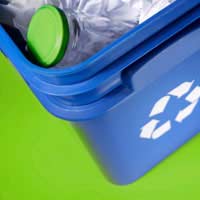The Importance of Recycling

In this day and age there's no excuse for failing to recycle. We all know that the household waste we produce pollutes our Earth in mountainous landfills, lets off poisonous chemicals when it is burned or attempts to biodegrade, and endangers wildlife everywhere it is littered. With such terrible consequence, there is no reason to knowingly let any of this occur. Instead, swot up on the recycling information that will make all of the difference to our standard of living, and our children's, and their children's, and their children's…
Recycling Rundown
In case you've forgotten, recycling is the process by which waste items are collected and sorted, then processed into the raw materials that can later be manufactured into new products. Sometimes the waste being recycled is made into the same product over and over again, resulting in what is called closed loop recycling. Waste may also be recycled into different products, a cycle known as open loop recycling. Regardless of what happens to the materials that are created from recycled waste, the important point is that what already exists is being reused and no new waste need be generated.Recycling Reminder
If you haven't investigated recycling recently, you'll be amazed by the many products that can now be recycled. Remember that all materials should be clean and dry, and sorted as much as possible. Create piles for:- Plastics.
- Aluminium cans.
- Glass bottles.
- Plastic bags.
- Plastic cutlery.
- Styrofoam.
- Polystyrene.
- Milk and juice cartons.
- Newspapers and magazines.
- Greeting cards.
- Paper.
- Cardboard.
Rare Recycling
There may be some household waste that you generate that is not easily catered for by your standard recycling service. This does not mean that you should toss these items into the nearest rubbish bin, because specialty services do exist for rare recycling items. Many charities also accept donations of these items, including:- Eyeglasses.
- Desktop computers.
- Computer keyboards.
- Laptop computers and batteries.
- Mobile phones and chargers.
- Televisions.
- Cars.
Recycling Research
If you don't live in an area where household recycling is collected, you'll need to do a little research to find the recycling bank nearest you. Contact your local council for full information on recycling services near you.Unfortunately here in the UK we lag far behind many of our European neighbours in our recycling habits. The good news is that the amount of household waste recycled every year in the UK has steadily risen and 2005 saw the highest recycling rates yet. If we all do our part to recycle what we can, the next few years will certainly continue this trend. In addition to recycling what you can, try to reduce the number of products and packing that you purchase, and reuse those that you already own.
If you haven't started already, begin reducing, reusing and recycling your household waste and urge your family and friends to follow suit. Good luck!


Re: Coping With Strict Parents
I'm 14 and my parents are so strict they don't care that I am growing up and need to learn to be myself. Instead I go to bed at 7:30,…
Re: Coping With Strict Parents
Guys im 15 living with African parents ( Nigerian's to be precise) my dad took me and all my siblings mobile phone including my 19…
Re: Coping With Strict Parents
My mom , she always have rules in my life . I am 17 and this year gonna be 18 . My mom all the time taking my phone, checking my…
Re: Coping With Strict Parents
I'm already 17 and I'm in love to an 18yo girl with acute depression. When my parents found out, they are forcing me to stop all my…
Re: Coping with a Jealous Friend
The friends i keep are mostly male friends, because guys don't easily get jealous. My female friends always envy my life; for…
Re: Coping With Strict Parents
Yo guys, Im 10 and I just had an argument with my mom, now she won’t help me with my drawing homework and my other writing…
Re: Beauty Tips for Boys
.
Re: Coping With Strict Parents
So basically im 17 years old when i was 13 years i used to talk with a male who is 22 years! Because of my daddy issues ive gotten…
Re: Steroids
where i can buy
Re: Coping With Strict Parents
I'm a 20 year old , my parents are so strict . I stay at home 24/7 , the only time I get to leave the house is when I'm going to…